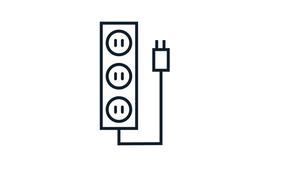Keep your home safe during the holidays
With the holidays fast approaching, Inspectional Services is providing a weekly blog related to home safety tips.
These tips can be useful during the holidays and throughout the year. If not used properly, extension cords can become a dangerous tool. Let's take a look at what you can do to avoid tripping hazards, electrical fires, short circuits, and damaged appliances.
Extension Cords
Using extension cords properly is critical to the safety of you and your family. Extension cords are commonly used in most households. They allow us to place electronics where we want them without having to place them near an outlet. These cords bring power to electrical devices without having to unplug and plug your devices. They are designed for temporary usage and should never be used as permanent wiring. Continuous usage can cause overheating, the insulation sheath to melt, and short circuits. If an extension cord is needed for an extended period of time, an additional outlet should be installed. If an extension cord feels hot to the touch, stop using it! With continuous use over time, an extension cord can rapidly deteriorate, creating a potentially dangerous electric shock or fire hazard.
Buyer BewareWhen purchasing extension cords, it is important to make sure they have been approved. Read the instructions (if available) for information about the cord's correct use and the amount of power it draws. Consider the length you'll need. Longer cords can't handle as much current as shorter cords of the same gauge. Do not power multiple appliances to one cord and never plug multiple cords together. This can cause your circuit to overload and catch on fire. Make sure the extension cord or temporary power strip you use is rated for the products to be plugged in and is marked for either indoor or outdoor use.
The Old Camouflage MethodWe all hate to see cords sticking out from the wall or running from one point to another. We do our best to tuck them as close to the wall as possible. There are those times when tucking just won't do the trick and some may result to hiding them all together by putting cords under rugs, furniture, doorways, ceilings, or floors. This is very dangerous and not practical. Cords that are covered can trap heat, damage the cord, and may result in a fire. As electrical current passes through the cord, electrical resistance causes voltage drop and heating of the wire.
The AttachmentAdhering the cord to the door frame with tape, staples, or nails can definitely cause a fire.
Damaged GoodsDo not use cut, frayed, damaged, or exposed extension cords. They can overheat and short circuit without the proper sheath insulation and also can give you an electric shock or burn. Inadequate insulation can cause overheating and short circuiting.
Outdoor vs. IndoorNever use indoor extension cords outdoors. If setting up outdoor electronics make sure you only use extension cords marked for outdoor use. Do not leave your outdoor extension cord outside for more than a day or two because the materials in the cord can break down and potentially result in sparking, shock, or a fire.


